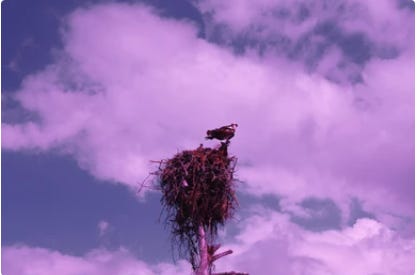I arrive at my boyfriend’s spouse’s apartment—non-monogamy is a mouthful—to find a robin’s nest wedged above the floodlight in the backyard. The yard is blanketed by a 7’x20’ patch of AstroTurf surrounded by cinder block walls—a true Manhattan refuge. Four baby birds are bundled in the nest, beaks snapping blindly into the air, until the mother robin returns with worms in her mouth. I climb onto a lawn chair to take a photo from a better angle. I send the photo to my boyfriend’s spouse with a text full of exclamation points. The spouse knows I’m crashing at their vacant apartment, and still, I worry: Was it an intrusion? The photo-snapping, and the sending.
I’m staying at my boyfriend’s spouse’s apartment because they are gone for the summer and I want to strangle my fiancé all the time. We’ve been corralled in a one-bedroom apartment for four straight months, since the beginning of the pandemic, and I need time alone. Our nest is too small, I tell him. What I don't tell him is that I need to figure out if I can live without him.
A week earlier, my fiancé and I are sipping iced lattes on a bench in Tompkins Square Park when two birders stop in front of us, binoculars dangling from their necks. “There are five hawks spread about the park,” the man birder says to the woman birder. I lean in, envisioning what it might be like to be the kind of person whose brain cooperated long enough to count the number of hawks in trees. “Can you imagine a hobby as pointless as birdwatching?” my fiancé asks.
On the second day at my boyfriend’s spouse's apartment, my sister calls with news from Egypt: Sohad, my father’s eldest sister, and the family matriarch, has died. She was 94. Out of eight siblings, she is the sixth to die. My father was the fourth. I try to explain this loss to my fiancé but my sadness is too hard and hollow to place. She’s a woman who died at a diable age an ocean away. Whom I’ve spent only two seasons with, but whose cherub cheeks and broad shoulders mirrored my father’s, and mine. How do I explain the sensation of my home drifting further from me with every death?
The first time my father brought our family to Cairo, Sohad served us Hamam Mahshi for dinner— stuffed pigeon—an Egyptian delicacy, and my father’s favorite. They looked like brazed rubber chickens. I picked at the innards, nibbling on the raisins and cinnamon-spiced rice, trying to look pleased, instead of what my 11-year-old self actually was, which was horrified. The morning of our return flight, Sohad tried to sneak a pack of frozen pigeons into my sister's suitcase.
Before I met my fiancé, I was a touring musician and a miserable Upper East Side nanny. One afternoon I was at a stoplight with the two just-as-miserable girls I babysat when a minivan swerved across the road in front of us. The minivan pulled onto the curb in front of the stoplight and screeched to a stop. The passenger doors flung open and two men holding gigantic butterfly nets jumped out either side and bolted toward a flock of pigeons on the sidewalk. I looked on with the girls, dumbstruck, as the men cast their nets down onto the concrete, capturing a good dozen pigeons, then leaped back into the minivan and sped away.
“Why did they do that??” the four-year-old asked, alarmed.
“I don’t know, sweetpea,” I lied, and thought of Sohad.
Less than 5% of mammals are monogamous for life. (The jury is still out on me.) Hawks, however, are said to be monogamous. Tompkins Square Park was once home to two of them—Dora and Christo, a male and female pair who maintained separate nests among the park's ginkgo tree over several years. The pair raised dozens of fledglings in the park, until 2018, when Dora sustained a wing injury and was taken to a wildlife refuge in New Jersey. Within days of her leaving, Christo was spotted with a new, unidentified female hawk in Dora’s nest. Local birders named this new hawk Amalia. Weeks later, Dora returned from the refuge to find Amalia still in her nest. Amalia attacked Dora, who was returned to the refuge once more. This time, permanently.
When I met my fiancé, I was a touring musician and needed a good reason to stop touring. I was sick of being broke and gone all of the time, missing everybody’s birthday parties. It didn’t matter that I don’t like parties. I wanted to be invited to the parties. “What if I went back to school?” I said aloud on his couch a few weeks in, mid-smooch. He loved this idea. He dreaded the notion that his girlfriend would be away from him for weeks at a time, I could already tell this about him. “What if I helped with your applications?” he offered. No one had ever asked me to stay.
In Middle Eastern culture, the hawk symbolizes intuition and higher vision: to be clear of mind, focused, and never harbor doubt. In 1972, Muammar Gaddafi created the Federation of Arabic Republics, emblazoning a hawk on its flag, in hopes of unifying a region splintered by years of colonialism and infighting. It didn’t do much good. The Federation survived less than five years before being disbanded into its previous, disparate parts.
Now I have a degree and a ring and an apartment with a walk-in closet. I have lost 15 pounds and most of my desire to touch and be touched by him—this dear, jumpy man who asked me to stay. There are tense nights and arguments that conclude with me hyperventilating in the walk-in closet. More than one but less than five. My coworkers are too polite to ask why I sometimes arrive at the office looking like I’ve been crying, or why I have been engaged for three years but have no plans to get married. The word fiancé closes in on me like pollen so I begin referring to him as my partner instead.
1972 is also the year my father fled Egypt, leaving behind seven siblings and a giant extended family. He was 36 when he left—old enough to understand risk-benefit analysis. I started pestering him with questions only once I’d left home myself and understood he would someday die, taking Egypt with him. Were you scared? Did you miss your family? Did you plan to go back? “Not really,” he would say, swatting the air. Distant, dismissive. I wanted to be nothing like him but end up so much like him.
“Hi Robin!” my boyfriend’s spouse texts me. The spouse is excited about this development, the birds nest and me staying at their apartment while they learn to farm upstate. They invite me to raid their bookshelf and send detailed instructions to connect to the Bluetooth Sound system. With each invitation, my chest is flooded with warmth. I’ve been dating their husband for two years, but my relationship with them is only just beginning. It feels special and intimate to be the girlfriend welcomed into their home. I spend my afternoons reclined in their hammock, playing bossa nova from inside the apartment, watching the robin as she flits about the small patches of fake grass, foraging for food.
I read all about robins. I learn that they’re migratory birds. They stay ahead of warm fronts, building temporary habitats for a season, and then migrate just before the cold weather arrives. I imagine coming and going as I please. Then I worry about how long it’s been since I last texted my fiancé.
Inside the apartment, I take up virtual Arabic lessons and plow through every amateur birder blog and New York Post article I can find on the Tompkins Square Park hawk triangle. Christo and Amalia are on to their third round of fledglings. Dora has been sequestered to a natural habitat in New Jersey, where she settled with a platonic life partner named Andrew. I tell myself this is a not-so-terrible way to live, though I don’t fully believe it.
Everywhere, I search for clues: Am I a hawk, a robin, a pigeon, or my father?
On the last evening at my boyfriend’s spouse’s apartment, my partner comes over for dinner. He was anxious about our time apart, about this entire experiment, so I made dinner into an effort: twinkly lights strewn across the cinder block walls, hammock dusted and hung, homemade guac, his favorite Mexican takeout. I imagine it will be romantic, and I will make the gesture of inviting him to spend the night in my boyfriend’s spouse’s bed, but when he arrives, he is sullen and tense. At the table, he clenches his fist. He recites the litany of ways I have failed to connect with him while I was here, away from him. I nimbly chew tortilla chips and mutter a mouthful of phrases, one that includes the word “breakup.”
But we don’t.
Instead he goes home, and I simmer in the yard, dreaming about some other temperate summer, when the wind patterns might shift. When I might finally find it within myself to say: You are not leaving because you are a leaver. You are leaving because your body intuits what your mind does not yet fully understand. Because a floodlight surrounded by cinder block walls is only a temporary habitat, and a walk-in closet is not a home.
On the final morning at my boyfriend’s spouse’s apartment, I return to the yard to get one last good look at the robin’s nest, and I find that they have gone.





Excellent Aly! xo
Beautiful.